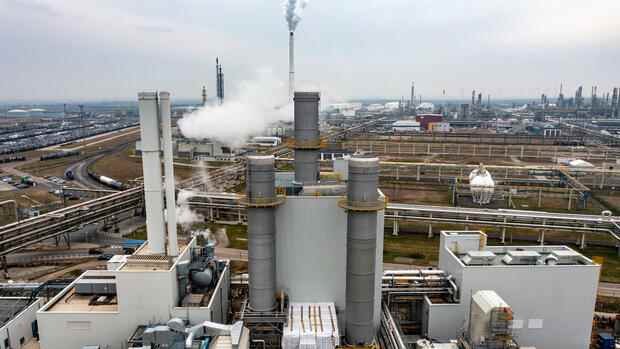Brussels, Frankfurt The European Parliament has approved the controversial EU eco-label for gas and nuclear power. Instead of the 353 MEPs required to reject this extension, only 278 voted against the legal act on the so-called taxonomy in the plenary session in Strasbourg. This means that gas and nuclear power are now classified as climate-friendly technologies in the EU taxonomy.
The taxonomy is intended to give investors on the European capital markets a guide as to which investments are sustainable and which are not. It is considered crucial for the green transformation of the economy because it is intended to help direct capital towards sustainable companies and projects.
The taxonomy itself has been in effect since the beginning of the year. After the vote by the European Parliament, the way is now clear for investments in nuclear and gas power plants to be marketed as climate-friendly from January 2023. No major resistance is expected in the EU Council, in which the 27 member states are represented and which still has to agree.
The inclusion of gas and nuclear power has been highly controversial. The Greens in the European Parliament rejected the EU Commission’s proposal unanimously, and there was also great protest in other groups. Even dozens of conservatives opposed it.
Top jobs of the day
Find the best jobs now and
be notified by email.
The opponents reacted disappointed to their voting defeat. “Today’s vote will sooner or later turn out to be a mistake,” said CSU parliamentarian Markus Ferber. It was unfortunate that Parliament “didn’t have the guts” to set an example for a credible taxonomy.
Green MP Rasmus Andresen said the taxonomy was now “unusable as a green seal of approval for financial products”. In terms of security and climate policy, the EU is on the wrong track.
>> Read here: Ten European energy ministers are sounding the alarm – Europe should go back to nuclear power
The Ukraine war had provided opponents with another argument: they had warned that promoting gas-fired power plants would ultimately help Russian President Vladimir Putin. The more money flows into gas power plants, the more gas they would consume. To date, Europe has obtained most of its gas from Russia. It is still unclear how quickly it can be replaced by liquid gas supplies.
The federal government opposed the proposal
The EU Commission had presented the supplementary legal act on the taxonomy on New Year’s Eve 2021. In doing so, she accommodated Germany and France, whose economies are heavily dependent on gas and nuclear power respectively.
In the meantime, the federal government has positioned itself against the proposal, but the majority in the EU Council is still considered secure. There is only one hurdle: Austria and Luxembourg want to take legal action against the amendment before the European Court of Justice.
The financial industry welcomes the fact that there is now clarity about the taxonomy. However, there is concern that the eco-label will be devalued by now including the non-sustainable bridging technologies. The credibility of the taxonomy would be damaged, says Volker Brühl from the think tank Center for Financial Studies in Frankfurt. Many fund managers see it that way too.
Thomas Richter, chief executive of the German fund association BVI, said his industry cannot and does not want to assess whether nuclear energy and natural gas are to be considered sustainable or unsustainable. “However, we believe that the EU taxonomy should be strictly based on scientific criteria in order to facilitate the global spread of sustainable investments,” he said. “Since the ability of nuclear energy and natural gas to be included in the taxonomy is not only politically controversial, but also scientifically, we would have found it better if Parliament had decided against inclusion in the taxonomy.”
Ingo Speich from the savings bank subsidiary Deka Investment would have preferred a different result. “We still see nuclear power as unsustainable,” he says. One of the basic principles of sustainability is the intergenerational obligation. “Future generations must not be unduly burdened by our current actions. The unresolved question of final storage breaks with this principle Speich, on the other hand, as a form of bridging technology: “But only if the narrow specifications, as broken down in the taxonomy, are also taken into account.”
The energy sector, on the other hand, breathes a sigh of relief. The Federation of German Industries (BDI) had warned before the decision that the urgently needed investments in energy infrastructure would become more expensive without the decision. Thanks to the eco-label, energy companies can issue bonds at lower interest rates.
They can also raise capital more easily on the stock market because ESG funds can continue to buy their paper. These funds may only invest in sustainable companies.
The taxonomy is seen as a key lever to accelerate the growth of green investments in Europe. According to a study by New Financial, the capital market sector “green finance” in Europe has already quintupled in the past five years. Last year alone, 311 billion euros were collected for green financing.
Green investment growth needs to accelerate significantly if the EU is to reach its 2050 goal of climate neutrality, the study says. So far, they account for only twelve percent of all capital market activities. The largest part of the “green” capital, 95 percent, is therefore generated by bonds and loans. The stock market has played a minor role so far.
More: Not just private capital – How the EU taxonomy also diverts tax money
